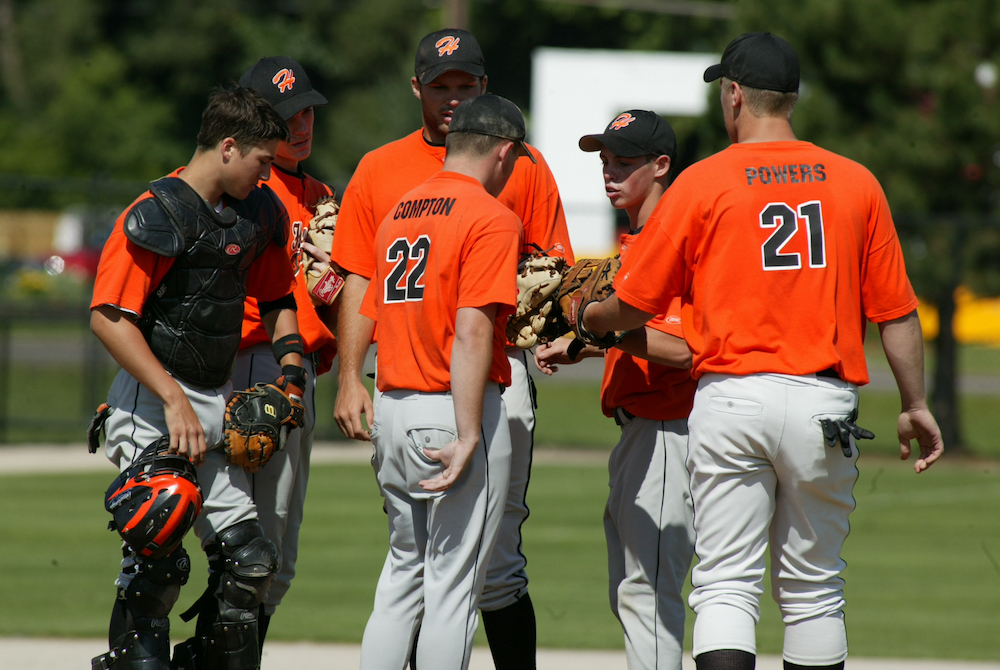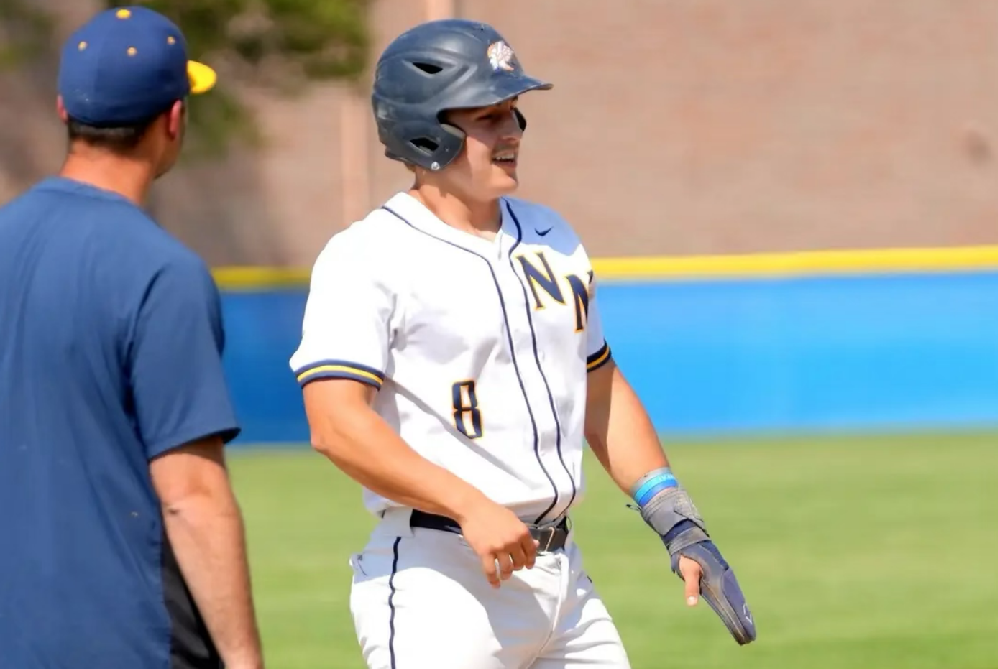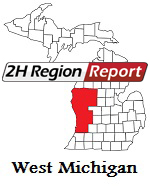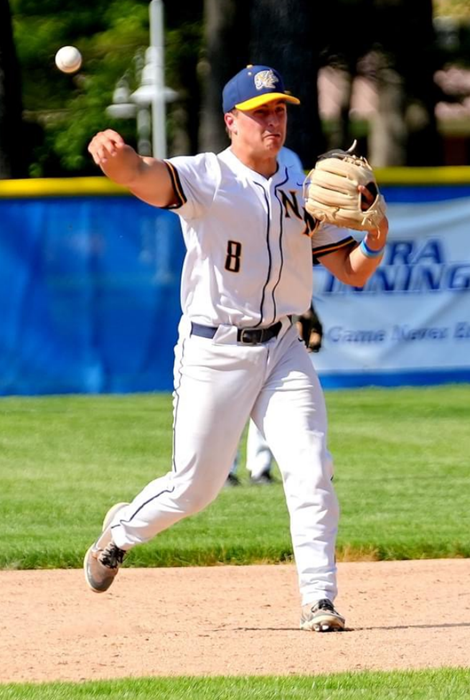
St. Mary's Record Run Recalls Homer's 'Small-Town Baseball Odyssey'
By
Geoff Kimmerly
MHSAA.com senior editor
April 21, 2023
As Orchard Lake St. Mary’s celebrated setting the MHSAA record for longest baseball winning streak at 77 and counting over the weekend – and with a national record certainly within reach this season – we can recall just two decades ago when Homer’s similar streak and the two seasons of buzz it stirred was on the verge of its start.
Homer, representing a community of about 1,700 residents, finished 38-0 on the way to winning the Division 3 championship in 2004, and then returned to win its first 37 games of 2005 before falling to Saginaw Nouvel 7-6 in that season’s Division 3 Final at Battle Creek’s C.O. Brown Stadium.
Along the way over those two seasons, the Trojans smashed the previous MHSAA baseball consecutive wins record of 56, and went on to set a national record of 75 straight wins that stood until 2011, when it was surpassed by both Martensdale St. Mary’s of Iowa and Portsmouth, N.H. The latter has topped the national list since 2012 after extending its winning streak into 2012 to the current record of 89 games.
Battle Creek Enquirer reporter Jeff Karzen followed Homer’s record run through many of its most notable moments, and that coverage and the relationships built during that time – and as the Trojans came back to win the Division 4 title in 2006 – led to his first book “Homer: The Small-Town Baseball Odyssey” published in 2011.
Below is an excerpt highlighting the small school’s run to national stardom – followed by updates on a few of the major players who helped the Trojans become unforgettable.
Buy the book here: JeffKarzen.com
***
 Homer: The Small-Town Baseball Odyssey
Homer: The Small-Town Baseball Odyssey
August Publications
Copyright © 2011 Jeff Karzen
All rights reserved
First edition published 2008
Second edition published 2012
Homer began the 2005 season ranked No. 1 in Division 3, a spot it had grabbed and held onto for the second half of ’04. Seven starters returned from a team that had made history with a 38-0 season. Still, Homer had some things to prove to itself.
So far in high school, and even as Little Leaguers, this group of Homer players had been largely defined by Josh Collmenter and Matt Powers. In big postseason games, Collmenter and Powers would take the pressure off their younger teammates and welcome it squarely on their shoulders. Collmenter was always the big-game pitcher. Powers could always be counted on in the middle of the batting order. How would Homer deal without having its two leaders?
“They definitely set the mindset for our team,” Dan Holcomb said of Collmenter and Powers. “When you’re a freshman coming up you don’t really know what varsity is all about or what Homer baseball is all about. You get up there and having those young guys playing against teams like Blissfield is kind of overwhelming. But having guys like Josh and Matt kept you loose and didn’t let you think about Blissfield, or think about seven state titles [won by the Royals]. They just said, ‘Hey guys, let’s have some fun. We’re going out to play some baseball today.’ They just made sure everyone had their mind right.”
Whether it was nerves about following up the unbeaten season with a good showing or an uneasy feeling taking the field without their two leaders, the Trojans began the new season with a close call in a doubleheader against Marshall and its star, Evan Sharpley. Marshall was a good team and a much bigger school, but Homer simply didn’t have it. Somehow, the Trojans escaped with a 14-13 win in eight innings (the most runs it had given up in years) and then a 4-2 triumph in Game Two. With the first two wins under their belt, the Trojans began to roll. Over the next 12 games, they gave up a total of 13 runs, proof that the season opener was nothing more than a fluke. Collmenter and Powers were missing, but junior-dominated Homer began to form its own identity.
The state record for consecutive wins was 56, set by Grand Haven High School from 1960-62. Homer’s Trojans were quickly nearing the record. The streak had reached 49 games when Homer took the short drive west on M-60 for a Big Eight tilt with the Union City Chargers. By now, the other teams in Homer’s conference had basically ruled out beating the powerhouse. Goals such as scoring runs, playing all seven innings without the mercy rule, and even putting the ball in play against Homer’s overpowering pitchers had become the scaled-down aspirations for the opponent.
One rival coach, Quincy’s Brett Allman, didn’t let his team watch Homer’s impressive pregame routine where the Trojan players showed off their big-time throwing arms and precision fielding. “When they warmed up, I talked to my team outside the dugout, or had them hit Wiffle balls or something,” Allman said. “Something besides watch them take infield. They put on a show. And they were proud of the way they took infield, and rightfully so. I don’t need to watch Dusty Compton throw the ball across the infield because I know what they can do. I didn’t think it would be real beneficial for my guys to watch them take infield.”
Under gray, rainy skies in Union City, both teams finished their warm-ups and looked around. Something was missing. It was going to be hard to play this game without any umpires in sight. They waited and waited. Finally, around 5 p.m., 30 minutes after the scheduled start time, one ump arrived. Knowing how much less is seen on the field with only one umpire (regular- season high-school games have two), Salow was hesitant to let the game begin. The lone umpire told both coaches that his partner was on the way, so the coaches acquiesced and allowed the game to start with one set of eyes in charge of the entire field. Union City must’ve forgotten that its opponent that day had won 49 consecutive games. The Chargers came out like they were the team to beat and jumped all over Homer. A few innings into the game, Homer was stunningly down 7-0. “I said to Tom, ‘Not only are we going to lose our streak but we’re going to get 10-runned (a mercy rule loss),’” Salow said.
Of course, Homer started chipping away at the lead. But seven runs was a lot to come back from, even for these Trojans. In the fifth inning, with Homer still trailing by a few runs, C.J. Finch decided it was time to take control of the perilous situation. “Not today! Not today!” Finch screamed. “This is not going to happen today.”
With rain continuing to fall, Homer got within one run in the sixth inning. That’s when the umpire, who worked alone all game, walked over to Homer’s dugout to speak with Salow.
“It’s not looking good, starting to rain harder. Not sure if we’re gonna be able to finish this thing,” the ump told Salow.
“Absolutely not,” the coach fired back. “We started this game 40 minutes late and if we’d started on time, it would be over by now. Not only that, but we have a streak going. These kids have worked too hard to put this streak together and they’re not going to lose it this way.”
The umpire caved in and so did Union City. Homer rallied to win 9-7, extending the winning streak to 50 games. Seven more remained to break the state record that had stood for 44 years.
“I was on pins and needles,” Union City coach Joe Tinervia said of his team’s near-miss. “I was playing that game like it was 1-0. That shows you what I think of Homer.”
A few weeks later, Homer easily topped Concord 10-0 to tie Grand Haven’s state record of 56 straight wins. The stage was set for the talented boys from the one-stoplight town to make history. A Friday doubleheader against Reading, one of the conference’s better teams, would be the record-breaker. It seemed fitting, too, because Reading had handed Homer its last loss in a regional playoff game in 2003. Homer made history in a rather ho-hum affair, winning Game 1 of the doubleheader, 12-2. “It wasn’t breathtaking or staggering or awe-inspiring,” a Battle Creek Enquirer columnist wrote the next day. “But it was efficient. Forgive Homer if it didn’t stage a large celebration for the new record. It’s just that the boys are used to winning.”
“It was just good enough, not flashy,” Salow said after his team won its 57th straight baseball game. “I’d like to think we’re a blue-collar club. It’s the way guys are taught in practice and in the classroom. We try and never get too high or too low.”
***
Where are they now?
- Josh Collmenter pitched in Major League Baseball for seven seasons, the first five-plus for Arizona before finishing his career with Atlanta. He won a career-high 11 games in 2014 and finished his pro career with a 38-35 MLB record. He currently is living in Phoenix and doing radio and TV for Diamondbacks broadcasts.
- Scott Salow left Homer and became superintendent at Petersburg Summerfield in 2021. He coached the Trojans through 2019, building a career record of 577-157.
- Dan Holcomb lives in Nashville, Tenn., and has been a Seattle Mariners scout for six seasons, covering Tennessee, Alabama and Mississippi. He spent six years as a college coach prior to scouting. He pitched collegiately at University of Evansville, Grand Valley State University and Huntingon University (Ind.).
- Dale Cornstubble is married with two kids and living in Homer. He is an electrician and teaches catching lessons on the side. He played at Central Michigan University and was drafted and played briefly in the minor leagues for the Kansas City Royals.
PHOTO Homer players meet on the mound during their 2004 Division 3 Semifinal win over Muskegon Oakridge.

Savoring Every Moment, Meyers Helping North Muskegon Extend Memorable Run
By
Tom Kendra
Special for MHSAA.com
May 29, 2024
Ben Meyers is cherishing every second of his senior baseball season – because he has learned, on several occasions, how quickly everything can be taken away.
 Meyers is the leader of Division 3 top-ranked North Muskegon, which already has eclipsed the 30-win plateau heading into this weekend’s District tournament.
Meyers is the leader of Division 3 top-ranked North Muskegon, which already has eclipsed the 30-win plateau heading into this weekend’s District tournament.
“I think we’re in a really good spot,” said Meyers after a rare loss, 3-1, on May 23 against neighboring rival Muskegon Reeths-Puffer.
“We are playing some good teams before Districts to help get us ready. Everyone is trying to get ready and get focused to make a run.”
Meyers, who splits time between the critical positions of catcher and shortstop, is either first or second on the team in almost every statistical category – notably with a .425 batting average, 48 hits, 40 RBIs, 49 runs and a sparkling .980 fielding percentage.
His leadership skills are even more important as one of just four seniors for the young Norsemen, who start three juniors and four sophomores.
North Muskegon, which is 30-5 and 12-0 against West Michigan Conference opponents (NM has won 35 consecutive WMC games), opens District play against Kent City on Saturday at Montague.
Meyers was in a similar leadership role for the North Muskegon football team this fall, before breaking his fibula on the second play from scrimmage during the third game of the season against Mason County Central.
Meyers worked tirelessly, and his team kept winning, giving him the chance to get back on the field for the Division 7 Regional Final against Pewamo-Westphalia, where he started on defense and made a slew of tackles and even recovered a fumble – before the unthinkable happened in the third quarter.
The outside linebacker bit on a play-action pass and when he planted his foot, he heard a familiar pop from the same leg and knew immediately his football comeback was over.
North Muskegon won a thriller over P-W that day, but Meyers was sidelined and unable to help his team the following week as its playoff run ended with a 32-21 loss to Menominee in the Division 7 Semifinals.
 “Right when that second injury happened, I knew that basketball was done, too, but I was determined to get healthy and make the most of baseball season,” explained Meyers, whose junior brother, Charlie Meyers, is also a standout three-sport athlete. “It’s made me extra focused, for sure. I know I can’t take a single game or a single play for granted.”
“Right when that second injury happened, I knew that basketball was done, too, but I was determined to get healthy and make the most of baseball season,” explained Meyers, whose junior brother, Charlie Meyers, is also a standout three-sport athlete. “It’s made me extra focused, for sure. I know I can’t take a single game or a single play for granted.”
Meyers missed his entire senior basketball season – another memorable campaign as NM followed up an undefeated football regular season with a 20-0 basketball regular season, before falling to P-W in a Division 3 Regional Semifinal.
Now healthy, Meyers – who has committed to play baseball at Davenport University in Grand Rapids – would love to cap off an already record-breaking year for North Muskegon sports with a run to the Baseball Finals at Michigan State University’s McLane Stadium. NM advanced to the Regional Finals last spring before losing to Lansing Catholic.
Garret Moyer, in his third year as North Muskegon’s head coach, normally pencils Meyers into the third spot in the batting order, but has at times slotted him first or second because of his versatility.
“As good of a player as Ben is, he is an even better teammate,” said Moyer, who is assisted by Collin Houseman and Ryan Mieler. “He is team-first in everything he does. Everybody in our program looks up to him.”
Meyers is especially adept at handling NM’s deep pitching staff. The Norse have a pair of aces in senior Ryan Delora (committed to Lansing Community College) and sophomore Logan Slimko, but also a slew of capable arms behind them – notably Jaxon Bean, Ace Anderson and Kylan Nielsen.
While Meyers is moving up the all-time state rankings in career hits and RBIs, perhaps his most impressive skill is stealing bases. Meyers has a team-high 34 stolen bases this season and more than 100 for his career – an unheard-of number for a catcher.
“I’m not that fast, but my secret is knowing how to get a good jump,” said Meyers, who noted that playing catcher helps him with that.
The son of Dan Meyers and Katie Brewer, he also finds time to work as a field technician at Trace Analytical and carries a 3.97 GPA. He plans to major in supply chain management at Davenport.
North Muskegon’s outstanding season is being played out against the backdrop of a small-town turf war between the school’s soccer and baseball programs. NM’s James B. Johnson Baseball Field (affectionately known as “The Shipyard”) was razed this offseason in favor of new soccer fields, with final plans for a new baseball stadium still in the works.
In the meantime, the Norsemen have played all of their 35 games on the road, utilizing Muskegon Community College, historic Marsh Field, Fruitland Field, Softball World and other locations for games and practices.
Meyers acknowledges that the loss of their home field was a big issue for much of the season but, at this point, the team is focused on other things – namely, having fun playing as many games as possible together.
And he said the team is now using the lack of a home field as a mental motivator.
“We’ve been driving all over for practices and games for a couple of months now,” said Meyers. “We’re used to it. I mean, what team is more ready for the state tournament and all of the travel than us?”
 Tom Kendra worked 23 years at The Muskegon Chronicle, including five as assistant sports editor and the final six as sports editor through 2011. E-mail him at [email protected] with story ideas for Muskegon, Oceana, Mason, Lake, Oceola, Mecosta and Newaygo counties.
Tom Kendra worked 23 years at The Muskegon Chronicle, including five as assistant sports editor and the final six as sports editor through 2011. E-mail him at [email protected] with story ideas for Muskegon, Oceana, Mason, Lake, Oceola, Mecosta and Newaygo counties.
PHOTOS (Top) North Muskegon’s Ben Meyers talks with one of his coaches while standing on third base. (Middle) Meyers, playing shortstop, throws to first base. (Photos courtesy of the Local Sports Journal.)

